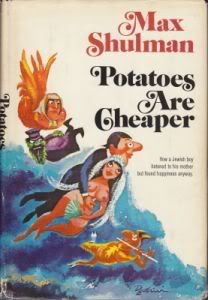© Max Shulman 1971
235 pages
The dearest book in my private library is not a groundshaking or even remotely serious: it is rather a collection of humorous short stories entitled The Many Loves of Dobie Gillis. I came upon it completely by accident, my high-school librarian giving it to me in the midst of her annual shelf-clearing. It's easily the funniest and most charming book I've ever read: I would chance fire to rescue it from a burning house, and I would buy another book off the internet blindly to read more from the same author because of its effect on me. That's how I came to read Potatoes are Cheaper.
In the midst of the Great Depression, Marty Katz and his cousin Albert have just come up with a brilliant way to escape poverty: they'll head for college to find and woo homely rich girls. The girls have to be Jewish of course, since Marty and Albert's mothers are. While the boys might not object to marrying a "shiksa", their mothers would never tolerate it. Determined to debunk the myth that 'Jewish girls don't put out', each boy soon has his mark, Marty's being the only heir of a theater magnate. Marty commissions poetry from his cousin "Crip" in order to woo young Celeste Zimmerman in hopes of marrying her lovely stacks of money. This Crip is only too happy to do, for he lives vicariously through the romantic triumphs of his cousin.
If Katz's uphill battle against winning the tolerance of Celeste's father wasn't enough, Celeste happily forwarded one of Crip's love poems -- signed under Marty's name -- to a school literary journal, where it catches the eye of one Bridget O'Flynn. Bridget is very lovely, and very much smitten by Katz and "his" poem. Although Katz would readily take advantage of the situation, ever willing having a little fun before returning to the war for Celeste and her father's heart, Bridget has an unexpected effect on young Marty. She's captured his heart. Thus Marty must choose between two women, each with enjoyable 'assets'. His mother and cousin think him daft for wanting to choose love over easy money, especially given that his status as a "poet" is fraudulent. It's a a comic love triangle, one that might be sometimes tragic if Marty weren't such a boor.
Tomatoes are Cheaper was a enjoyable read: wildly funny, of course, sometimes bawdily so. It's not Dobie Gillis, but definitely a book I'll return to for laughs in the future.

Have you ever read any of Richard Gehman's food related books (The Sausage Book http://www.amazon.com/sausage-book-compendium-accompanying-Pennsylvania/dp/0517146584/ref=sr_1_1?ie=UTF8&s=books&qid=1268197791&sr=1-1 or The haphazard gourmet,: Being a carelessly compiled, aimless, alternately infuriating and ingratiating compendium of recipes, personal reminiscences, and etc http://www.amazon.com/haphazard-gourmet-alternately-ingratiating-reminiscences/dp/B0007DNN4K/ref=sr_1_31?ie=UTF8&s=books&qid=1268197916&sr=1-31 )? For some reason your review of this book reminded me of these entertaining and ribald cookbooks.
ReplyDeleteHm, no I haven't. Food is one subject I've never read about, actually!
ReplyDeleteThis was my parents' go-to book for tough times. There's deeply problematic stuff in it -- trigger warnings for rape not treated as serious, for one -- but most of the humor is directed at the Jewish population of Minneapolis/St. Paul, and my Jewish parents adored it.
ReplyDeleteSuitor: "My parents unfortunately are both dead."
Prospective mother-in-law:
"From what, bullets?"
A college library in Minneapolis had a copy some decades back.